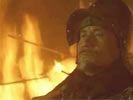Eye For Film >> Movies >> Battle Of Wits (2006) Film Review
It is 370 BCE, during the so-called Warring States Period when all China was riven by internecine conflict. The Zhao Nation has sent a massive force of 100,000 warriors to attack the Yan Nation, but first they must take Liang, a small city outpost of 4,000 people that lies between the two Nations. Liang has sent out requests for help to the Mozi Warriors, peacekeepers and experts at defence, but with the Zhao vanguard encamped just outside the city gates, the drunken, dissolute King Liang (Wang Zhiwen), egged on by the Royal Tutor (Wu Ma), has already issued the orders for surrender.
At this desperate moment, a lone stranger arrives. Ge Li (Andy Lau - Infernal Affairs, House Of Flying Daggers) is a modest, unassuming Mozi with a talent for strategy and an aversion to unnecessary bloodshed – and he is quick to warn of the dire consequences of surrender and to demonstrate his skills under siege.

Granted powers of military command by the diffident king, he uses clever tactics to thwart one Zhao attack after another, against overwhelming odds. His conduct in battle gradually earns him the respect of Liang's princely son (Choi Si-won), the loyalty of head archer Zi Tuan (Nicky Wu), the love of cavalry leader Yi Yue (Fan Bingbing), and the affection of the common people – but as Ge Li continues to keep the city safe, he also incurs the personal enmity of not just the Zhao commander Xiang Yanzhong (Ahn Sung-kee) but of the king himself, jealous of his new deputy's popularity and anxious to stamp out any threat to his own power-base.
From Homer's Iliad onwards, a city siege has often formed the basis of grand epic, as the values of civilisation itself take a last stand against pressures both internal and external. It is tradition continued by the likes of Tanit Jitnukul's Bang Rajan (2000), Kim Sung-su's Musa (2001) (also featuring Ahn Sung-kee), Peter Jackson's The Lord of the Rings: The Two Towers (2002), Wolfgang Petersen's Troy (2004) and Ridley Scott's Kingdom Of Heaven (2005) - yet where all these films have tended to focus on martial heroics, Jacon Cheung's Battle Of Wits is concerned far less with the clanging of arms than with the clash of ideologies.
Cheung's film concentrates not so much on fighting itself as the question of what fighting is for, and whether it can ever be justified. When Ge Li arrives, preaching a message of universal love and embodying the pacifist philosophy known as Mohism, he seems more messiah than soldier, offering a moral alternative to the war, suffering and death that have become the common currency of the time – even if, paradoxically, he must fight, and even occasionally kill, to save lives.
His humanist principles are constantly tested both by realities on the ground and by the inhumanity of those on both sides of the conflict – and his theories in themselves provoke all manner of envy and resentment, with disastrous consequences for himself and other people. All of which makes Battle Of Wits a thorough-going reflection upon the place of high ideals in the grim field of war - with an ambivalent, decidedly downbeat ending that celebrates Ge Li's rigorous ethics and extraordinary strategic thinking even as it questions whether these have really achieved anything at all. Ultimately, every victory in this film seems hollow, and Ge Li's Jesus-like lessons, for all their merits, might as well be uttered by the mute.
As its very title suggests, Battle Of Wits is a war film of a decidedly intellectual bent. Thoughtful, restrained and deadly serious, it is as indirect in its depiction of real battle as Ge Li is in his approach to it. Fans of the type of visceral spectacle and boys' own derring-do recently popularised by Steven Spielberg's Saving Private Ryan (1998) are bound to be disappointed. For those, however, who fancy a more dialectical perspective on the morality (or otherwise) of war, the film represents the more philosophical end of epic – with a multi-faceted narrative to ensure that there is never a dull moment in its two-hours-plus duration. And if the film portrays a ruinously divided China, the uniformly excellent Chinese-Korean cast and Japanese manga-based screenplay point, through themselves, to the very practical possibility of pan-Asian unity.
War may be a chaotic confounding of cause and effect, but Cheung's film is a model of artistic harmony.
Reviewed on: 09 Jan 2009




















